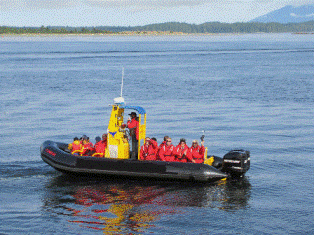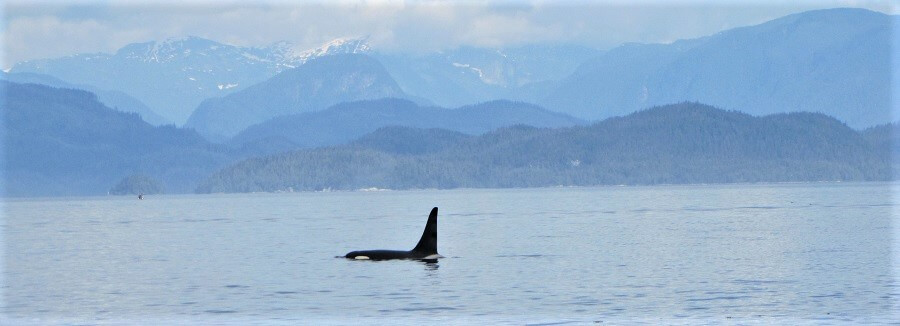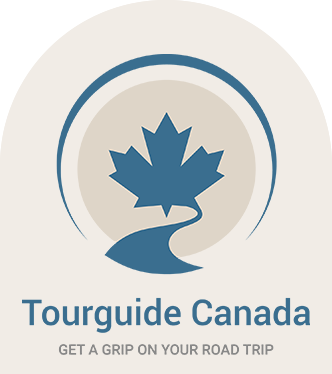Whale watching British Columbia
This page is about the giant species inhabiting British Columbia's waters.
What you need to know about whale watching in British Columbia!
I joined quite a few whale watching tours in British Columbia. Most of them have been in the food-rich waters around Vancouver Island. Every time I go whale watching, it is different. I cannot remember NOT having seen any whales at all at a specific outing, although some whale watching tours had higher scores than others.
On this page:
Popular places to go whale watching around Vancouver Island
Whale species in British Columbia
Best season to go whale watching in British Columbia
Good reasons for joining a whale watch tour
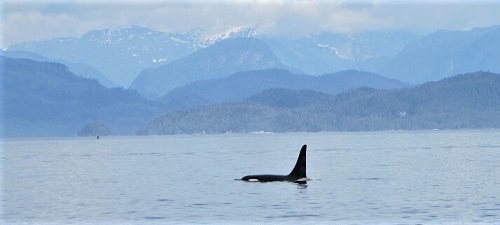 orca spotted in the Johnstone Strait
orca spotted in the Johnstone StraitThe best spots to go whale watching in British Columbia
Popular places to go whale watching on Vancouver Island
West Vancouver Island: Tofino & Ucluelet
- Here you have great opportunities to spot Humpbacks and Grey whales.
- Occasionally, Orcas hunt in these waters.
- There is also good chance of seeing other marine wildlife such as:
- Sea otters,
- Bald eagles,
- Steller sea lions, and
- Harbour seals.
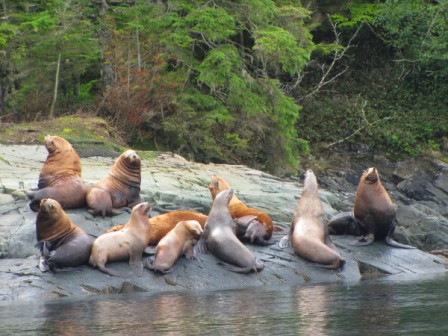 a group Steller sea lions resting on a rock
a group Steller sea lions resting on a rockA possible downside of whale watching on the west coast of Vancouver Island
You will most likely hit open water while whale watching on the west coast of Vancouver Island.
Prevent motion sickness by avoiding any coffee before your outing and by using just a light meal some while before the start of your trip.
South Vancouver Island: Victoria
- A few pods of southern resident Orcas inhabit the waters around the Gulf Islands and Haro Strait.
- On a regular base, other whale species such as Humbacks and Grey whales are spotted.
North-east Vancouver Island: Telegraph Cove & Port Mc Neill
- Situated on the northern east side of Vancouver Island, it is the number one location for watching Orcas –killer whales- feeding in the Johnstone Strait.
- Chances are good to spot Humpback whales as well.
- Other species that are commonly seen in the Johnstone Strait are
- White-sided dolphins,
- Dall’s porpoise,
- Steller sea-lions,
- Harbor seals, and
- Bald eagles.
Pro for whale watching in the Johnstone Strait
As the ocean water in the Johnstone Strait is very calm, there is no or at least very little chance of, getting motion sickness.
Several outfitters offer whale-watching tours in the Johnstone Strait.
Whale species British Columbia
British Columbia has a diversity of whale species, which are the focus of interest for whale watchers.
Most species are migratory and are present in food-rich BC waters, only for a specific time-frame.
Orca (Killer whale)
Humpback whale
Grey whale
Dolphin and Porpoise species
Orca – Orcinus orca (Killer whale)
The orca or killer whale, belongs to the Dolphin family and suborder of the toothed whales.
There are three different subspecies of killer whales found in BC waters.
- Resident killer whales feed on salmon and therefore follow the salmon run.
Two separate populations are distinguished. These do not interact and/or mate with one another.
* Southern residents (around Victoria and the Gulf Islands) and
* Northern residents (Northern Vancouver Island and the Johnstone Strait).
Resident orcas form strong family groups that feed on salmon. They detect their prey by using echolocation. Mutual communication informs pod members about the location of the salmon. - Transient killer whales are mammal-eating whales. They hunt for seals, sea lions, porpoises and other whale species. Occasionally they are spotted while whale watching in British Columbia.
- Offshore killer whales will not be the target off whale watching tours as they live too far from shore.
Read the page Whale Watching Canada, to check when to view Orcas.
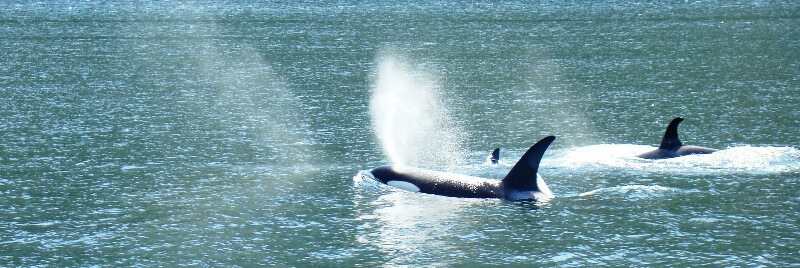 a pod of northern resident orcas seen on a whale watch tour in the Johnstone Strait
a pod of northern resident orcas seen on a whale watch tour in the Johnstone StraitHumpback whale - Megaptera novaeangliae
A Humpback male whale is famous for its magical song. This migrating baleen whale forages near shorelines on krill, plankton and tiny fish.
After 3-5 shallow dives, it regularly shows a tail fluke when diving for deeper waters.
There is a good chance of spotting Humpback whales during whale watching tours in British Columbia. When lucky, you might see a Humpback breaching or fin slapping.
Almost hunted to extinction in the last century, the Humpback makes a comeback in BC waters although it is still listed as threatened.
Read the page Whale Watching Canada, to check when to view Humpbacks.
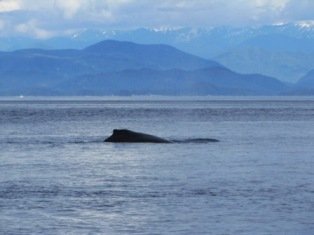 a Humpback whale's dorsal fin
a Humpback whale's dorsal finGrey whale - Eschrichtius robustus
Only found along Canada’s west coast, the Grey whale is a bottom feeder.
This whale takes several breaths before it dives down.
Close to the bottom, it turns on its side, and takes a mouthful of sediment from an area of shallow sea floor. It uses its baleen to filter tiny little creatures from the ocean floor.
They consume 400-1000 kg (880-2200 pounds) of food on an average summer day.
Each spring these giants migrate along the west coast of Vancouver Island.
Some Grey whales spend all summer in the food-rich waters of BC.
Others continue travelling up north, all the way into Alaska.
Read the page Whale Watching Canada, to check when to view Grey whales.
Dolphin and Porpoise species
Dolphin and Porpoise species, such as
- White-sided dolphins,
- White-beaked dolphins,
- Pacific white-sided dolphin,
- Dall’s porpoise, and
- Harbour porpoise,
are incidentally viewed while whale watching in British Columbia.
These highly intelligent and social animals sometimes approach boats and even seem to enjoy riding bow waves.
I have seen many dolphin and porpoise on whale watch trips in the Johnstone Strait.
On the other hand, I haven’t seen any dolphins yet on any of my whale watching tours on the west coast of Vancouver Island.
Best season to go whale watching in BC
The best seasons to go whale watching in BC are definitely spring, summer and fall!
Most whale species spend the Canadian winter in warm southern waters. This is where the calves are born. During spring, most whales migrate north, often passing BC waters. Some are going as far north as the Bering Sea, Alaska. Others stay all summer in - food rich- BC waters.
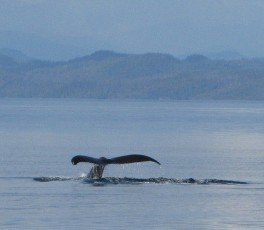 tail fluke from a humpback whale in the waters around Telegraph Cove, BC
tail fluke from a humpback whale in the waters around Telegraph Cove, BCReasons to go whale watching in British Columbia
- Joining a whale watch tour offers an important educational experience to whale watchers. Ask upon booking if there is a wild life biologist on board of your whale watch outing.
- Some outfitters have developed long-term monitoring programmes. They contribute their data to scientific studies and institutes. Therefore, they help us to learn more about the behaviour and life history of marine mammals.
- Whale watching within British Columbia helps the local economy. It benefits directly coastal communities.
Sources:
Wild whales - b.c. cetacean sightings network
Canadian Technical Report of Fisheries and Aquatic Sciences 2363 (PDF file)
